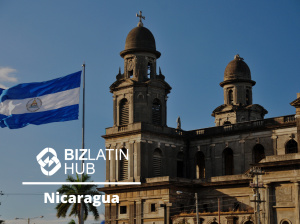Chile’s employment law is based on the Chilean Labor Code and includes detailed requirements for contracts, wages, working hours, benefits, and termination procedures. This 2025 guide supports employers in complying with labor law when hiring or considering company formation in Chile.
Key Takeaways
| What are the working hours mandated by employment law in Chile? | The working week is capped at 44 hours, going down to 42 in 2026 and eventually to 40 in 2028. Employers are being encouraged to get to 40 faster if possible. |
| What is the Chilean minimum wage? | The current minimum wage as of January 2025 is CLP$510,500 (aprox USD$515). |
| Types of Employment Contracts in Chile | Indefinite-term. Fixed-term contracts (generally only up to one year) Project contracts |
| What percentage of an employee’s salary is contributed to social security in Chile? | Total contribution is roughly 5.7% of an employee’s salary, paid mostly through the employee’s pension fund. |
Overview of Chilean Labor Code
Chile’s labor regulations establish a standard 44-hour workweek, which will be progressively reduced to 40 hours up to the year 2028. It offers flexibility through the availability of fixed-term or indefinite employment contracts. The nation enforces a national minimum wage, ensuring fair compensation, and guarantees annual paid leave for employees.
Maternity leave is provided with full pay, and comprehensive social security contributions extend coverage to health and retirement benefits. Notably, Chile’s labor laws recognize and emphasize collective bargaining, safety regulations, and the fundamental right to strike as integral components of the workforce framework.
Types of Employment Contracts in Chile
There are three contract types under employment law in Chile that are most commonly used by foreign investors and corporations.
Indefinite-term contracts
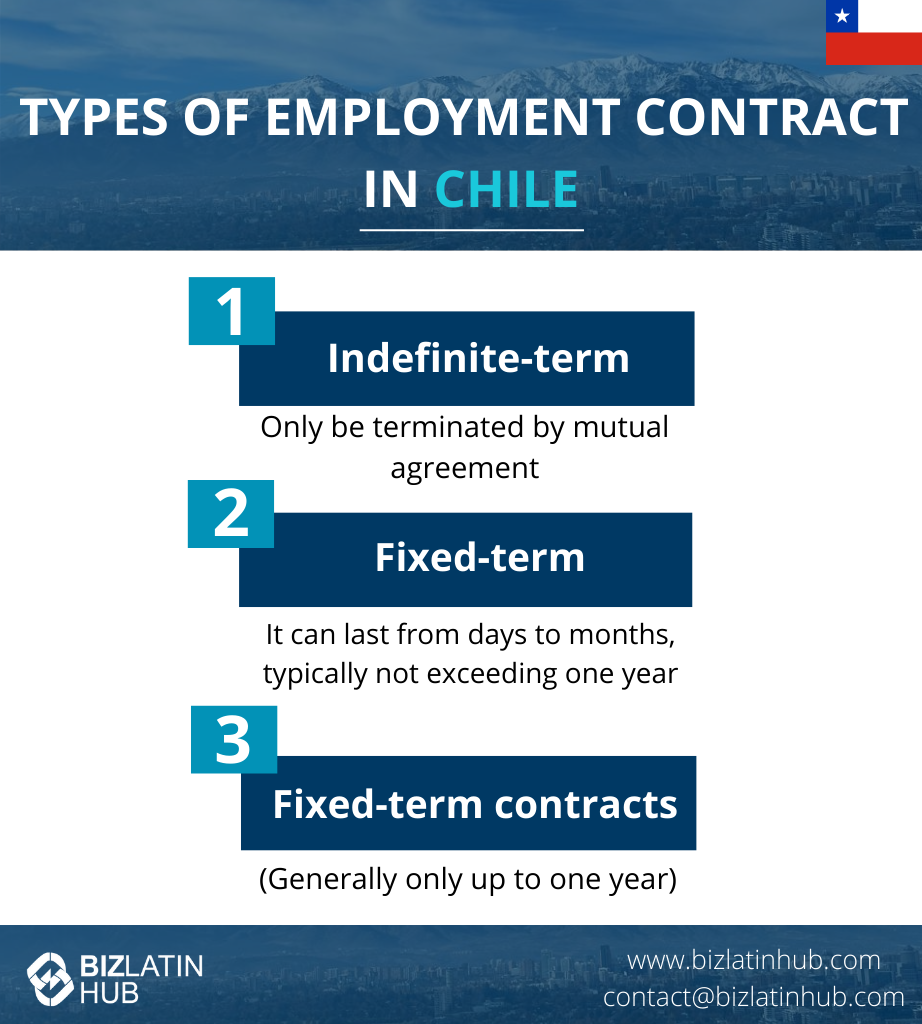
The most common type of contract used in Chile and can only be terminated by mutual agreement between the employee and employer, or when one of the parties can act unilaterally, such as in the case of the employee resigning.
Fixed-term contracts
These can last for days, weeks, or months, but they generally do not exceed more than one year. However, in certain cases they can last for up to two years.
Project-based and temporary contracts
Regarded as an “undetermined contract”, these have no specific date for when the contract ends, meaning that clear makers and thresholds must be established in order to eliminate any ambiguities regarding the completion of the project.
Working Hours, Overtime, and Leave
Under employment law in Chile, a standard working week is currently 44 hours long and divided into no fewer than five and no more than six days. An average working day is nine hours long.
It is important to note that a new law entered into force in 2024, reducing the weekly working hours progressively, starting at 44 in 2024, 42 hours in 2026, and finally 40 hours in 2028. However, the government is encouraging companies to reach the 40-hour goal ahead of schedule, giving out awards for those that do.
Under current employment law, only workers in manager and executive positions, without direct supervision, can be exempted from the mandatory working hours rules. Note that in Chile there are generally between nine and 12 national holidays that fall on weekdays per calendar year.
According to employment law in Chile, after 12 months of service with the same employer, an employee is entitled to 15 days of paid vacation leave. That leave can be accrued for a period of up to two years, meaning an employee can build up 30 days of PTO.
Under Article 70 of the Chilean labor code, when an employee accrues two periods of PTO allowance, the employer is obliged to grant or instruct the employee to use the allowance from at least one of those allowances (i.e. 15 days of leave) before the completion of a third period and accrual of more leave.
It must be noted that PTO is a nonnegotiable guarantee under Chilean Law, which means that it cannot be replaced by financial compensation, and cannot be given up by the employee, and will ultimately have to be paid for by the employer at the end of the contract in case they were not used.
- Sick leave: Employees are entitled to payment for leave due to illness, however, when that sick leave lasts for less than 11 days, they do not get paid for the first three days. For example, if an employee is off work sick for five days, they will be entitled to payment for two of those days.
If sick leave lasts for 11 consecutive work days or more, the employee is entitled to payment for all of them. In all cases, sick leave is paid for by the employer’s health insurance provider.
Note that within two working days of returning to work, an employee must present documentation proving their illness that is signed by a registered physician.
- Maternity and paternity leave: According to employment law in Chile, maternity leave allowance totals 12 weeks and begins six weeks before the expected date of birth. Fathers are entitled to five days of paid paternity leave. However, in the event that the mother does not use all of her maternity leave allowance, she is able to transfer it to the father from the seventh week after the birth of the child.
Maternity and paternity leave are paid for by the government or the company health insurance provider. - Bereavement leave: In the event of the death of a spouse, civil partner, or child, employees are entitled to bereavement leave totaling seven days. In the event of the death of a parent, they are entitled to paid bereavement leave totaling three days.
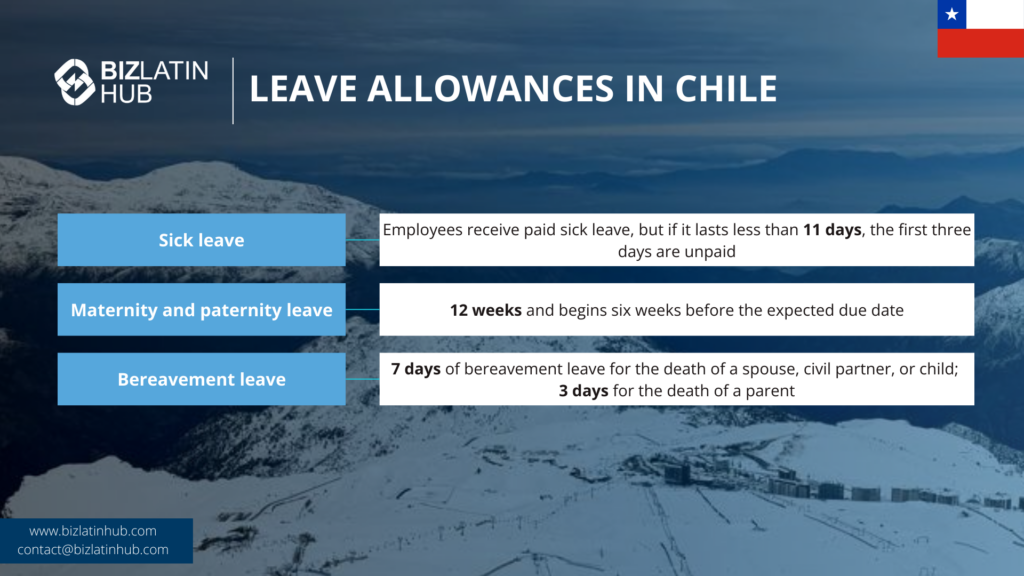
According to employment law in Chile, employers must oversee making the following deductions from employee salaries and contributions from employers must be made:
- Employee deductions generally total around 18.6% of the employee’s salary, including an 11% deduction that goes toward the pension fund chosen by the employee.
Additionally, a 7% deduction goes to the national public health agency FONASA, and a deduction goes towards unemployment insurance and totals approximately 0.6%. Note that the minimum wage according to employment law was set at 337,000 Chilean pesos (approximately US $408) in 2021. - Employer contributions total around 5.7% of an employee’s salary, with a contribution equal to 2.3% of the salary going towards disability insurance and paid through the employee’s pension fund.
A further contribution of 2.4% must also be made for unemployment insurance and is also paid through the same pension fund.
Accident insurance is based on the level of occupational risk associated with the role being undertaken, however, it generally totals around 0.93%. - Profit sharing is mandatory under Chilean employment law and means that any company must share 30% of net profits with its employees. The share received by each individual is calculated based on their salary level, and profit shares can be distributed on a monthly or annual basis, based on the preference of the employer.
| Category | Employer Obligations | Employee Rights |
|---|---|---|
| Work Week | Max 45 hours/week; 5 or 6-day workweek | Protection against excessive working hours |
| Employment Contract | Must be in writing and signed within 15 days | Right to receive written terms of employment |
| Social Security | Enroll in AFP (pension), health insurance, and unemployment insurance | Access to public benefits and insurance programs |
| Paid Leave | 15 working days of paid vacation annually | Accrued leave benefits |
| Termination | Comply with cause or severance laws | Right to severance and legal notice |
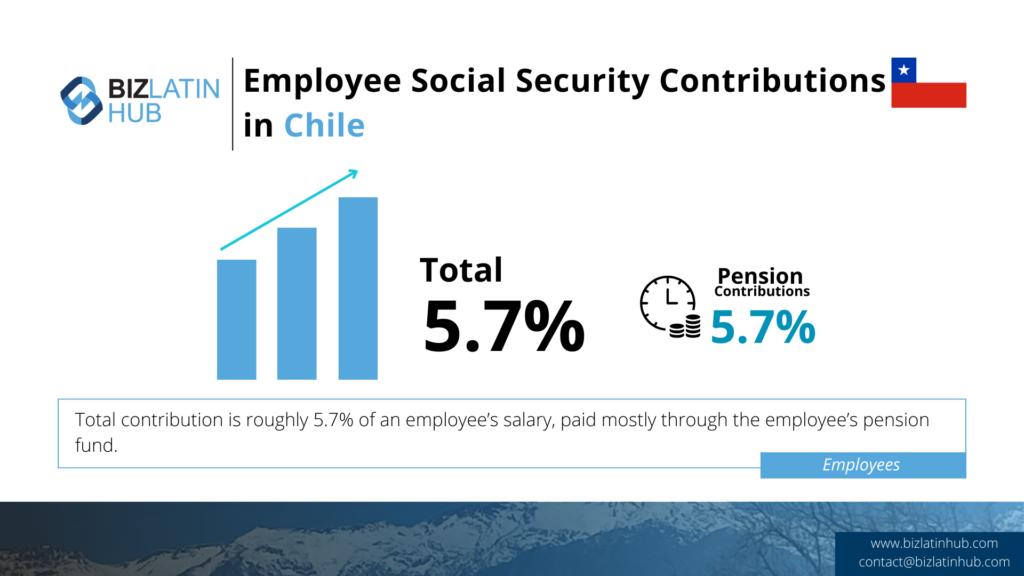
Dismissal and Severance in Chile
The employer must give notice, which depending on the cause can be up to 30 days, explaining the cause of the termination. It is required to execute an employment termination agreement with the employee, that must be reported to the Labor Authority. Depending on the case, proof of payment of the mandatory severance must be required. Social security payments must be completed up until the day of termination.
Under Chilean Labor Law, the causes for termination in Chile are the following:
a. With Severance Pay
For company needs, termination can occur without fault for:
- Market or economic changes.
- Decreased productivity.
- Modernization.
- Termination by eviction.
This is unilateral for managerial roles, domestic workers, or exclusive trust positions. No severance if 30 days’ notice; otherwise, pay equals remuneration.
b. Without Severance Pay:
- Lack of probity: dishonesty, disloyalty, or dishonor.
- Acts of violence: physical aggression.
- Defamation: offensive speech against the employer.
- Immoral conduct: unethical actions.
- Harassment: psychological harm to colleagues.
- Sexual harassment: non-consensual behavior.
- Unfair competition: confidentiality breach.
- Unjustified absence: repeated or lengthy absence.
- Abandonment: leaving work or refusal.
- Reckless acts: endangering others.
- Intentional damage: property destruction.
- Contract breach: serious obligations neglect.
If an employee is terminated for unjustified, improper, or unsubstantiated reasons, the employee may appeal to a court within 60 business days following the termination. In this case, a labor judge may order compensation in favor of the employee, which will increase based on the severity of the wrongdoing.
FAQs on employment law in Chile
In our experience, these are the common questions we face from our clients.
1. What are the labor laws in Chile?
Chile’s labor regulations establish a standard 44-hour workweek, which will be progressively reduced to 40 hours up to the year 2028. It offers flexibility through the availability of fixed-term or indefinite employment contracts. The nation enforces a national minimum wage, ensuring fair compensation, and guarantees annual paid leave for employees.
Maternity leave is provided with full pay, and comprehensive social security contributions extend coverage to health and retirement benefits. Notably, Chile’s labor laws recognize and emphasize collective bargaining, safety regulations, and the fundamental right to strike as integral components of the workforce framework.
2. What are the working conditions in Chile?
The working conditions in Chile are regulated by labor laws. According to these laws, employees are allowed to work for a maximum of 10 hours a day, for no more than six days a week or no fewer than five days a week.
Additionally, employees are entitled to a one-hour lunch break and can only work a maximum of two hours of overtime per day. Furthermore, all workers are guaranteed at least one 24-hour rest period during the workweek. While employers have the option to schedule employees to work six days a week, including Saturdays, they are not allowed to require work on Sundays.
It is also worth mentioning that the minimum age requirement for employment in Chile is 18 years old, except for those who are at least 15 years old and have written permission from their parents.
Lastly, probationary periods are not recognized in Chile, and companies often hire employees on fixed-term contracts for a maximum of 12 months, which can serve as a probationary period before transitioning into a permanent contract.
3. What is the legal workweek in Chile?
Employees may work a maximum of 45 hours per week, typically spread across 5 or 6 days. Overtime must be compensated at 150% of the normal hourly rate.
4. What is the minimum salary in Chile?
Minimum wage in Chile is periodically adjusted to account for inflation and other factors. As of January 2025, the minimum wage for a full-time employee will be set at CLP$510,500 per month, which is approximately USD$515.
5. How is overtime paid in Chile?
According to Chilean Labor Law, overtime hours are to be compensated with a 50% surcharge on the agreed salary for regular working hours, and must be paid along with the regular compensation for the respective period.
6. What is the legal process for dismissal?
Terminations must be documented and fall under accepted legal grounds. Without cause, employers must pay legal severance, including notice period and tenure-based compensation.
7. What are the requirements for terminating an employee in Chile?
The employer must give notice, which depending on the cause can be up to 30 days, explaining the cause of the termination. It is required to execute an employment termination agreement with the employee, that must be reported to the Labor Authority. Depending on the case, proof of payment of the mandatory severance must be required. Social security payments must be completed up until the day of termination.
8. What happens when an employee quits in Chile?
The employee must give notice to the employer when resigning, at least 30 days before leaving the job. If they fail to do so, the employer can deduct those days from the termination settlement as compensation.
9. Are written employment contracts mandatory in Chile?
Yes. Employment contracts must be signed within 15 days of the start date. They must include details on compensation, work hours, duties, and termination terms.
10. What social security contributions are mandatory?
Employers must contribute to:
Pension funds (AFP)
Health insurance (FONASA or private)
Unemployment insurance
11. Can a foreign company hire workers in Chile without incorporation?
No. Hiring legally in Chile requires either a local legal entity or an Employer of Record (EOR) arrangement with a registered service provider.
12. What are the paid vacation entitlements in Chile?
Employees are entitled to 15 working days of annual paid vacation after 1 year of continuous service. Certain regions (e.g., extreme zones) may grant additional leave.
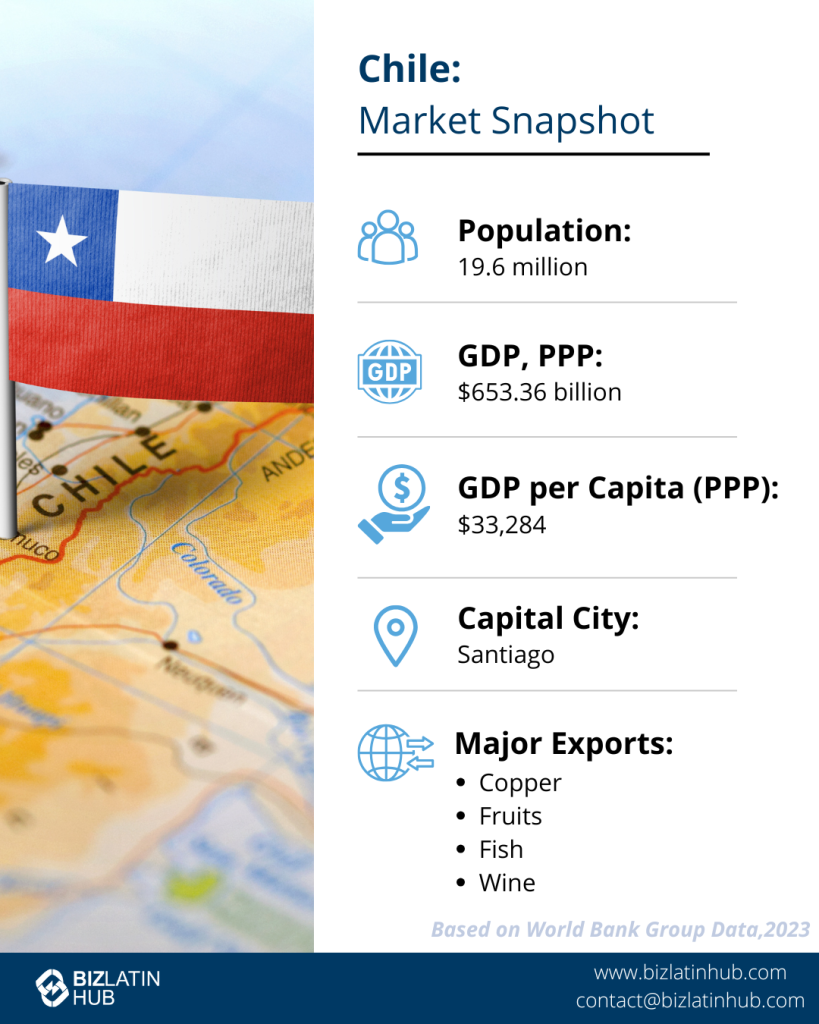
Biz Latin Hub can help with employment law in Chile
At Biz Latin Hub, our multilingual team of corporate support specialists is available to help you get to grips with and properly implement employment law in Chile.
We have a comprehensive portfolio of back-office services, including company formation, visa processing, accounting & taxation, legal services, and hiring & PEO, allowing us to offer tailored packages of integrated services to suit every need.
Beyond Chile, we also have teams operating in 15 other markets around Latin America and the Caribbean, and we specialize in multi-jurisdiction market entry.
Contact us today to receive more information about how we can support you doing business in Chile.
Or learn more about our team and expert authors.




